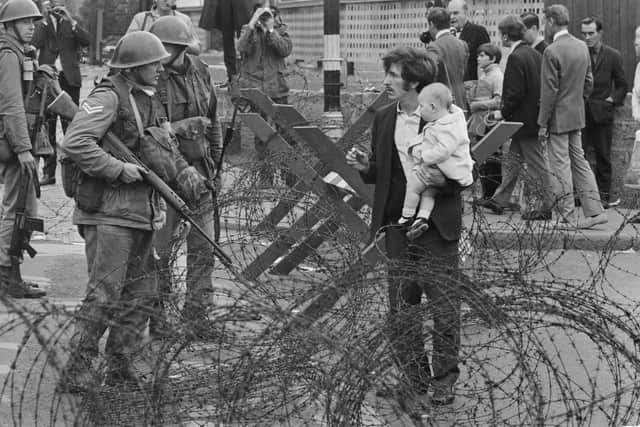Good Friday Agreement: 25 years on, we still must not take peace in Northern Ireland for granted – Christine Jardine


TV cameras, trained on windows illuminated by the light of late-night meetings, picked up the image of two individuals rising to hug one another. The significance of that gesture, in that moment, was beyond anything surely anyone could have anticipated. It was done. There was agreement on Northern Ireland.
So many of the images of its history had been painful, violent, even gruesome that a simple gesture of friendship, or perhaps relief, was breathtaking in its impact. Now, on the 25th Anniversary of the Belfast Good Friday Agreement, it is difficult to explain to a generation with no memory of ‘the Troubles’ how important those few days in April were, even to those of us who had never lived in Northern Ireland.
Advertisement
Hide AdAdvertisement
Hide AdYears of effort to end decades of pain and conflict were concentrated into a few days at the centre of the world’s spotlight. There are still, of course, constant hurdles and obstacles to effective devolved government in Northern Ireland, and the recent arguments over the Windsor Framework emphasise the continuing influence of historic differences.
But any examination of the past quarter of a century provides a testament to the success achieved in those rooms of huddled discussions. Progress towards the Belfast Good Friday agreement had begun shortly before Christmas 1993 with the Downing Street Declaration. The joint statement by Prime Minister John Major and Taoiseach Albert Reynolds stated it was the right of the people of Northern Ireland to decide between the UK or a United Ireland. It also acknowledged the importance of mutual consent in the north and south of the island in resolving issues.
In the following five years, there were ceasefires, cross-party talks and false starts before that historic announcement on April 10, 1998, which in essence contained three basic principles. They are: the parity of esteem of both communities, the principle of consent underpinning Northern Ireland’s constitutional status, and the birth-right of the people of Northern Ireland to identify and be accepted as British or Irish, or both, and to hold both British and Irish citizenship.
In the referendum which followed, 71 per cent of people who voted gave it their support. Documentaries about the time have focussed on the mammoth contributions of individuals such as Mo Mowlam, George Mitchell, Tony Blair and John Major. And, of course, Nobel Peace Laureates John Hume and David Trimble.
But perhaps it is those ordinary individuals who were willing to put aside decades of bloodshed, fear and animosity for the greater good, to whom we should pay tribute this week. Those of us who remember the loss of life and violent outrages people endured can only marvel at the spirit of reconciliation which has allowed former enemies to share power.
For too long, Northern Ireland’s history was depicted in figures recording deaths and injuries. Every day of the year is the anniversary of at least one death caused by the Troubles. And horrible though the idea might be, those same figures now reflect how much progress has been made.
In the 25 years before the Belfast Good Friday Agreement, there were more than 3,000 deaths and 47,000 people were injured as a result of the conflict. Since 1998, there have been fewer than 200 deaths. Still too many, of course, but a reflection of changed times.
In recent years, we have become more used to seeing Northern Ireland’s most difficult years portrayed in award-winning TV dramas and documentaries than played out in nightly news bulletins. But we should not fall into the trap of taking the state of peace, so painfully won, that now exists for granted.
Advertisement
Hide AdAdvertisement
Hide AdIn the immediate aftermath of Brexit, we saw violence return to the streets of Northern Ireland as the vagaries of our EU exit cast doubt on what it would mean for the Good Friday Agreement. The most recent devolved elections in Northern Ireland were in 2022, but the elected assembly has still to sit. Its predecessor had been suspended from 2017 until 2020.
As this anniversary approached, Westminster was keen, like others, to pay tribute to the success of the Belfast Good Friday Agreement and those who achieved it. But in the immediate wake of the dispute with the EU over the Northern Ireland Protocols and the new Windsor Agreement, there was also a very real sense of caution. We have seen the threat level increase recently and the re-emergence of old tensions on the streets and in political debate.
It is as incumbent on all of us in positions of influence now, as it was on those in power 25 years ago, to do whatever we can to protect what is an ongoing process. The Belfast Good Friday Agreement was perhaps above all else a statement of belief in the ability of people to mend decades of grievance and to forgive.
In what they have achieved in that quarter of a century, the people of Northern Ireland, of all communities, are to be admired and congratulated. The hope offered by that hug, witnessed by the watching world so many years ago, has been grasped and realised.
There is a scene in the final episode of Derry Girls which deals with the agreement and for me, sums it all up perfectly. One of the characters asks her grandfather what if they vote ‘yes’ and it doesn’t work. He replies: “What if it does? Then all this will become a ghost story that you tell your weans.” Let's hope he was right.
Christine Jardine is the Scottish Liberal Democrat MP for Edinburgh West
Comments
Want to join the conversation? Please or to comment on this article.